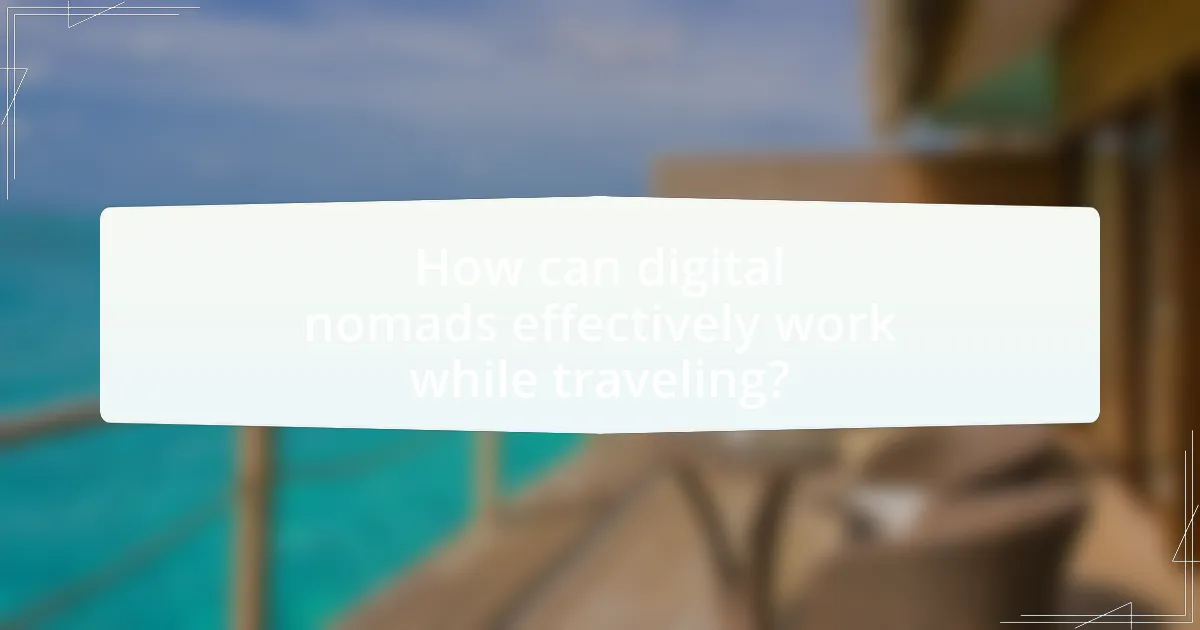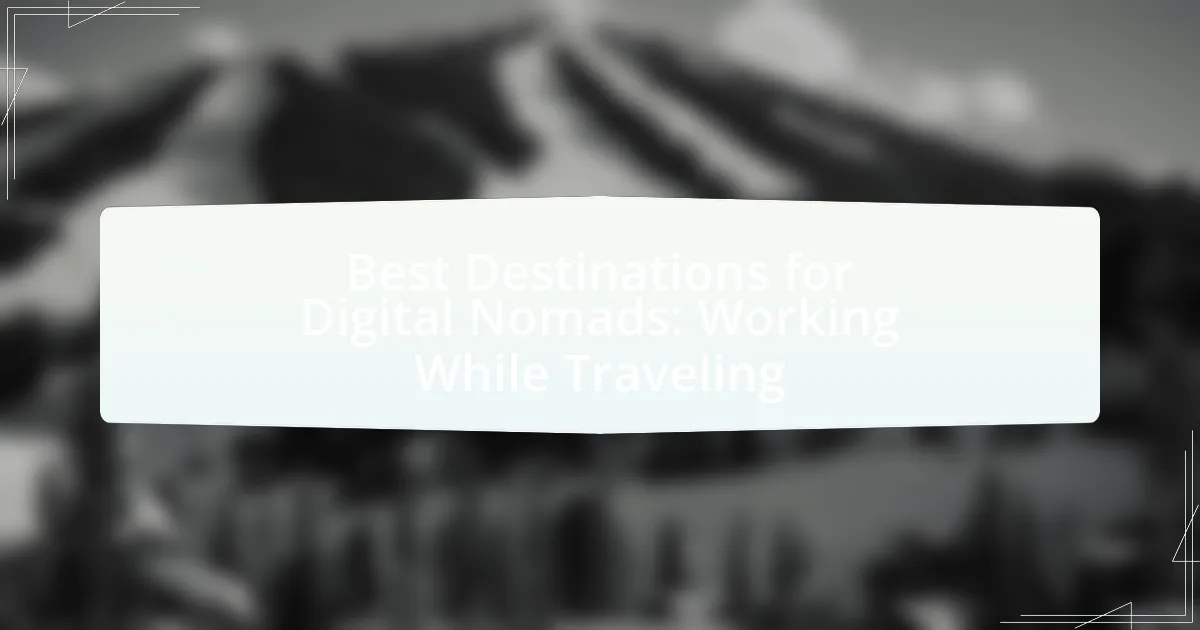The article focuses on the best destinations for digital nomads, highlighting locations such as Bali, Chiang Mai, Lisbon, and Medellín, which offer vibrant coworking spaces, affordable living costs, and supportive communities. It discusses how these destinations cater to the needs of remote workers through reliable internet, essential amenities, and cultural experiences. Key factors for choosing a destination include cost of living, internet connectivity, safety, and community support. The article also addresses challenges faced by digital nomads, such as legal issues and isolation, while providing strategies for maintaining productivity and work-life balance while traveling.

What are the Best Destinations for Digital Nomads?
The best destinations for digital nomads include Bali, Chiang Mai, Lisbon, and Medellín. Bali is renowned for its vibrant coworking spaces and affordable living costs, making it a top choice for remote workers. Chiang Mai offers a low cost of living and a strong community of digital nomads, with numerous cafes and coworking spaces. Lisbon attracts nomads with its rich culture, excellent internet connectivity, and a growing tech scene. Medellín is favored for its pleasant climate, affordable lifestyle, and a variety of coworking options. These locations provide the necessary infrastructure and community support for digital nomads to thrive while working remotely.
How do different locations cater to the needs of digital nomads?
Different locations cater to the needs of digital nomads by providing essential amenities such as reliable internet, coworking spaces, and affordable living costs. For instance, cities like Bali, Indonesia, offer numerous coworking spaces and a vibrant community of remote workers, making it an attractive destination. Similarly, Lisbon, Portugal, features a low cost of living and a growing number of digital nomad meetups, enhancing networking opportunities. Additionally, places like Chiang Mai, Thailand, are known for their affordable accommodations and strong expat communities, which support social interaction and collaboration among nomads. These factors collectively create environments conducive to productivity and lifestyle flexibility for digital nomads.
What factors should be considered when choosing a destination?
When choosing a destination for digital nomadism, factors such as cost of living, internet connectivity, safety, and community support should be considered. Cost of living affects budget management; for instance, cities like Chiang Mai in Thailand offer affordable living expenses, averaging around $600 per month. Internet connectivity is crucial for remote work; destinations like Lisbon in Portugal boast high-speed internet availability, essential for productivity. Safety is paramount, with countries like New Zealand ranking high on global safety indices, ensuring a secure environment for travelers. Lastly, community support is vital for networking and social interaction; places like Bali have established digital nomad communities, facilitating collaboration and connection among like-minded individuals.
How does cost of living impact the choice of destination?
The cost of living significantly impacts the choice of destination for digital nomads by influencing affordability and lifestyle options. When selecting a location, digital nomads often prioritize destinations where their income can sustain a comfortable lifestyle, which includes housing, food, transportation, and leisure activities. For instance, a survey by Nomad List indicates that cities like Chiang Mai, Thailand, and Lisbon, Portugal, are popular among digital nomads due to their low cost of living compared to cities like San Francisco or New York, where expenses are substantially higher. This financial consideration directly affects the ability to travel longer and enjoy a better quality of life while working remotely.
What are the top-rated cities for digital nomads?
The top-rated cities for digital nomads include Bali, Chiang Mai, Lisbon, Barcelona, and Medellín. These cities are favored for their affordable living costs, vibrant communities, and reliable internet connectivity. For instance, Bali is renowned for its coworking spaces and a strong expat network, while Chiang Mai offers a low cost of living and a rich cultural experience. Lisbon is praised for its mild climate and growing tech scene, Barcelona attracts nomads with its artistic vibe and amenities, and Medellín is noted for its pleasant weather and innovative public transport.
Which cities offer the best coworking spaces?
Cities that offer the best coworking spaces include New York City, Berlin, and Singapore. New York City is known for its diverse range of coworking options, with over 300 spaces catering to various industries and preferences. Berlin has become a hub for startups and freelancers, featuring innovative coworking environments that foster collaboration. Singapore ranks highly due to its strategic location in Asia and a growing number of modern coworking spaces that support both local and international professionals. These cities are recognized for their vibrant ecosystems, making them ideal for digital nomads seeking productive work environments.
How do local cultures influence the experience of digital nomads?
Local cultures significantly influence the experience of digital nomads by shaping their social interactions, work environments, and lifestyle choices. For instance, in countries with strong communal values, such as Thailand, digital nomads often find themselves engaging more deeply with local communities, which can enhance their social networks and provide a sense of belonging. Additionally, cultural practices, such as local festivals or cuisine, can enrich the nomadic experience, offering unique opportunities for exploration and learning. Research indicates that cultural immersion can lead to increased satisfaction and productivity among remote workers, as they adapt to and integrate aspects of the local culture into their daily routines.
What amenities are essential for digital nomads in their destinations?
Essential amenities for digital nomads in their destinations include reliable high-speed internet, comfortable workspaces, and access to power outlets. Reliable high-speed internet is crucial as it enables seamless communication and productivity, with many locations offering speeds of at least 25 Mbps, which is the minimum recommended for remote work. Comfortable workspaces, such as co-working spaces or cafes with adequate seating, provide an environment conducive to focus and collaboration. Access to power outlets ensures that devices remain charged, supporting extended work hours without interruptions. These amenities collectively enhance the work experience for digital nomads, allowing them to maintain productivity while traveling.
How important is internet connectivity in selecting a destination?
Internet connectivity is crucial in selecting a destination for digital nomads. Reliable internet access enables remote work, communication, and access to online resources, which are essential for maintaining productivity while traveling. According to a survey by FlexJobs, 65% of remote workers prioritize reliable internet when choosing a location, highlighting its significance in decision-making. Additionally, destinations with strong internet infrastructure attract more digital nomads, as they seek environments that support their work needs.
What role do social opportunities play in a digital nomad’s experience?
Social opportunities significantly enhance a digital nomad’s experience by fostering connections and community engagement. These interactions can lead to professional networking, collaboration on projects, and personal friendships, which are crucial for emotional well-being and motivation. Research indicates that socializing can improve mental health and productivity, making it essential for digital nomads who often work in isolation. For instance, a study published in the Journal of Happiness Studies found that social connections are directly linked to increased life satisfaction and work performance. Thus, access to social opportunities in various destinations is vital for a fulfilling digital nomad lifestyle.

How can digital nomads effectively work while traveling?
Digital nomads can effectively work while traveling by utilizing reliable internet access, establishing a structured routine, and leveraging productivity tools. Reliable internet is crucial, as it allows for seamless communication and access to work resources; many popular destinations for digital nomads, such as Bali and Lisbon, offer co-working spaces with high-speed internet. Establishing a structured routine helps maintain productivity; studies show that setting specific work hours can enhance focus and efficiency. Additionally, using productivity tools like project management software and time-tracking apps can streamline tasks and improve time management, enabling digital nomads to balance work and travel effectively.
What strategies can help maintain productivity on the road?
To maintain productivity on the road, digital nomads should implement structured routines, utilize technology effectively, and create conducive work environments. Establishing a daily schedule helps in managing time efficiently, while tools like project management software and communication apps facilitate collaboration and task tracking. Additionally, choosing quiet and comfortable locations for work, such as co-working spaces or cafes with reliable Wi-Fi, enhances focus and minimizes distractions. Research indicates that remote workers who adhere to a routine and leverage technology report higher productivity levels, underscoring the effectiveness of these strategies.
How can time management techniques be adapted for travel?
Time management techniques can be adapted for travel by prioritizing tasks based on travel schedules and using tools that facilitate remote work. Digital nomads can implement techniques such as the Pomodoro Technique to maintain focus during work hours while allowing for breaks to explore new locations. Additionally, utilizing digital calendars and project management apps helps in organizing work commitments around travel itineraries. Research indicates that effective time management can enhance productivity by up to 25%, which is crucial for balancing work and travel experiences.
What tools and apps are essential for remote work while traveling?
Essential tools and apps for remote work while traveling include communication platforms, project management software, and cloud storage services. Communication platforms like Slack and Zoom facilitate real-time collaboration and meetings, which are crucial for maintaining team connectivity regardless of location. Project management tools such as Trello or Asana help organize tasks and deadlines, ensuring productivity remains high while on the move. Cloud storage services like Google Drive or Dropbox provide secure access to files from any device, allowing for seamless document sharing and collaboration. These tools collectively enhance efficiency and connectivity, making remote work feasible and effective for travelers.
What challenges do digital nomads face while working abroad?
Digital nomads face several challenges while working abroad, including unreliable internet connectivity, cultural differences, and visa regulations. Unreliable internet can hinder productivity, as many digital nomads rely on stable connections for their work. Cultural differences may lead to misunderstandings in communication and work expectations, impacting collaboration with local clients or teams. Additionally, navigating visa regulations can be complex, as many countries have specific requirements for remote workers, which can limit the duration of stay or impose restrictions on work activities. These challenges can significantly affect the overall experience and effectiveness of digital nomads in their chosen destinations.
How can digital nomads overcome language barriers in foreign countries?
Digital nomads can overcome language barriers in foreign countries by utilizing language learning apps, hiring local translators, and engaging in language exchange programs. Language learning apps like Duolingo and Babbel provide structured lessons that can help nomads quickly acquire basic communication skills. Hiring local translators for important meetings or documents ensures accurate communication and understanding. Additionally, participating in language exchange programs allows digital nomads to practice the local language with native speakers, fostering both language skills and cultural connections. These methods are effective as they provide practical solutions for real-time communication challenges faced by nomads in diverse environments.
What are the common legal and visa issues faced by digital nomads?
Digital nomads commonly face legal and visa issues such as obtaining the appropriate work visas, navigating residency requirements, and ensuring compliance with local labor laws. Many countries do not have specific visa categories for remote workers, leading to uncertainty about legal status. For instance, the Schengen Area allows only short stays without a work visa, which complicates long-term stays for digital nomads. Additionally, tax obligations can arise if a nomad spends significant time in a country, potentially triggering local tax residency rules. These complexities highlight the importance of understanding each destination’s legal framework to avoid penalties or deportation.

What are the best practices for digital nomads to thrive in their lifestyle?
Digital nomads can thrive in their lifestyle by establishing a structured routine, leveraging technology for remote work, and choosing optimal locations with reliable internet access. A structured routine helps maintain productivity and work-life balance, while technology tools like project management software and communication platforms facilitate collaboration and efficiency. Additionally, selecting destinations known for coworking spaces and strong internet infrastructure, such as Bali or Lisbon, enhances the ability to work effectively while traveling. These practices are supported by surveys indicating that 70% of remote workers prioritize reliable internet when choosing a location, underscoring the importance of connectivity in the digital nomad lifestyle.
How can digital nomads build a supportive community while traveling?
Digital nomads can build a supportive community while traveling by actively engaging in co-working spaces, attending local meetups, and utilizing online platforms. Co-working spaces often host networking events and workshops, providing opportunities for digital nomads to connect with like-minded individuals. For instance, spaces like WeWork and Impact Hub frequently organize community events that foster collaboration and support among remote workers. Additionally, platforms such as Meetup and Facebook Groups allow nomads to find and join local gatherings, enhancing their social network. Research indicates that social connections significantly improve mental well-being, which underscores the importance of community for digital nomads.
What online platforms are best for connecting with other digital nomads?
The best online platforms for connecting with other digital nomads are Nomad List, Remote OK, and Facebook groups dedicated to digital nomad communities. Nomad List provides a comprehensive database of cities favored by digital nomads, including cost of living and internet speed, facilitating connections among users. Remote OK offers job listings specifically for remote work, allowing digital nomads to find employment while networking with others in the field. Facebook groups, such as “Digital Nomad Entrepreneurs” and “Digital Nomad Community,” serve as active forums where members share experiences, advice, and opportunities, fostering a sense of community among digital nomads.
How can attending local events enhance the nomadic experience?
Attending local events enhances the nomadic experience by fostering community connections and cultural immersion. Engaging with local events allows nomads to meet residents and other travelers, creating a sense of belonging and support. For instance, participating in festivals, workshops, or meetups can lead to networking opportunities that may benefit both personal and professional growth. Research indicates that social interactions significantly improve well-being and satisfaction, which is crucial for individuals living a nomadic lifestyle. Additionally, experiencing local traditions and customs through events enriches the understanding of the destination, making the travel experience more meaningful and memorable.
What tips can help digital nomads maintain work-life balance?
Digital nomads can maintain work-life balance by establishing a structured daily routine. A consistent schedule helps delineate work hours from personal time, which is crucial for productivity and relaxation. Research indicates that individuals who adhere to a routine experience lower stress levels and improved mental health. Additionally, setting clear boundaries, such as designating specific workspaces and utilizing tools like time management apps, can enhance focus and efficiency. Studies show that effective time management leads to better work outcomes and increased satisfaction in both professional and personal domains.
How can setting boundaries improve productivity and leisure time?
Setting boundaries can significantly enhance productivity and leisure time by creating clear distinctions between work and personal life. When individuals establish specific work hours and designated spaces for tasks, they minimize distractions and increase focus, leading to more efficient work output. Research indicates that professionals who set boundaries report higher job satisfaction and lower stress levels, which in turn allows for more quality leisure time. For example, a study published in the Journal of Occupational Health Psychology found that employees who maintained work-life boundaries experienced improved well-being and productivity. Thus, effective boundary-setting not only boosts work efficiency but also enriches personal time, allowing for a balanced lifestyle.
What routines can digital nomads establish to stay grounded while traveling?
Digital nomads can establish routines such as setting a consistent work schedule, engaging in daily physical activity, and maintaining social connections to stay grounded while traveling. A consistent work schedule helps create a sense of normalcy and productivity, allowing digital nomads to manage their time effectively despite changing environments. Engaging in daily physical activity, such as yoga or jogging, promotes mental well-being and helps combat the stress of constant travel. Additionally, maintaining social connections through regular check-ins with friends or joining local communities fosters a sense of belonging and stability, which is crucial for emotional health while on the move.
What resources are available for aspiring digital nomads?
Aspiring digital nomads can access various resources to facilitate their lifestyle, including online platforms, communities, and tools. Websites like Remote.co and We Work Remotely list job opportunities specifically for remote work, while platforms such as Nomad List provide information on cost of living, internet speed, and community feedback for different locations. Additionally, digital nomad communities on social media platforms and forums, such as Facebook groups and Reddit, offer support and advice. Tools like Trello and Slack enhance productivity and collaboration, making it easier to manage work while traveling. These resources collectively support the transition to a digital nomad lifestyle by providing job opportunities, community support, and productivity tools.
How can blogs and podcasts provide insights into the digital nomad lifestyle?
Blogs and podcasts provide insights into the digital nomad lifestyle by sharing personal experiences, practical tips, and destination recommendations from individuals actively living this lifestyle. These platforms often feature interviews with seasoned digital nomads who discuss their challenges, successes, and the tools they use to maintain productivity while traveling. For instance, a blog post might detail the best coworking spaces in Bali, while a podcast episode could explore the financial strategies of nomads who travel on a budget. This firsthand information helps aspiring digital nomads understand the realities of remote work, cultural adaptation, and community building in various locations, making it easier for them to plan their own journeys effectively.
What online courses can help prepare individuals for remote work while traveling?
Online courses that can help prepare individuals for remote work while traveling include “Remote Work Foundations” by LinkedIn Learning, “How to Work Remotely” by Coursera, and “Digital Nomad Masterclass” on Udemy. These courses cover essential skills such as time management, communication tools, and productivity strategies tailored for remote environments. For instance, the “Remote Work Foundations” course provides insights into best practices for remote collaboration, which is crucial for maintaining productivity while traveling.
What are the common pitfalls to avoid as a digital nomad?
Common pitfalls to avoid as a digital nomad include poor time management, lack of a stable internet connection, and inadequate financial planning. Poor time management can lead to missed deadlines and decreased productivity, as many digital nomads struggle to balance work and travel. A stable internet connection is crucial for remote work; without it, tasks can be delayed, impacting job performance. Inadequate financial planning can result in unexpected expenses or running out of funds, which is a significant risk for those traveling frequently. According to a survey by Remote Year, 40% of digital nomads reported financial instability as a major concern, highlighting the importance of budgeting and financial foresight.
How can financial mismanagement impact a digital nomad’s journey?
Financial mismanagement can severely disrupt a digital nomad’s journey by leading to unexpected expenses and financial instability. When a digital nomad fails to budget effectively, they may encounter situations where they cannot afford accommodation, food, or necessary travel expenses, forcing them to cut their trip short or seek less desirable living conditions. According to a survey by the Remote Work Association, 30% of digital nomads reported financial stress as a significant factor affecting their travel plans, highlighting the importance of sound financial planning. Additionally, mismanagement can result in missed opportunities for networking or experiences due to a lack of funds, ultimately diminishing the overall value of their journey.
What are the risks of isolation and how can they be mitigated?
The risks of isolation for digital nomads include mental health issues, decreased productivity, and a lack of social support. These risks can be mitigated by actively seeking social interactions through co-working spaces, joining local meetups, and utilizing online platforms to connect with other nomads. Research indicates that social isolation can lead to anxiety and depression, highlighting the importance of community engagement for mental well-being. For instance, a study published in the Journal of Health and Social Behavior found that social connections significantly improve psychological health, reinforcing the need for digital nomads to prioritize social interactions while traveling.

Leave a Reply